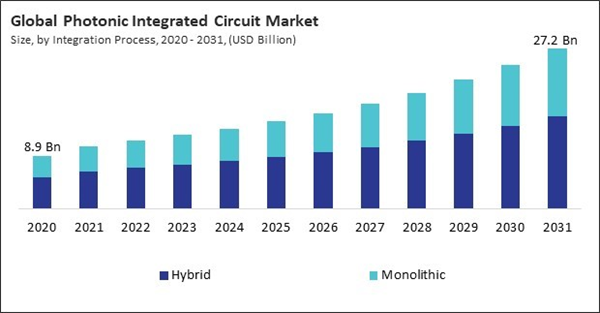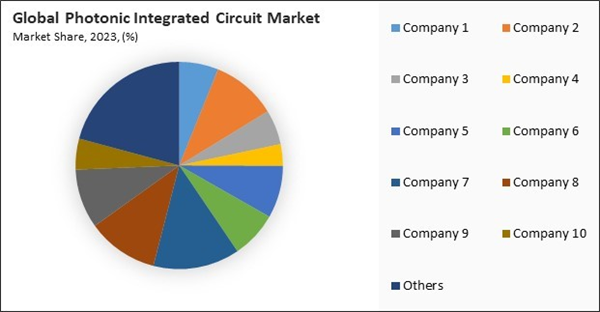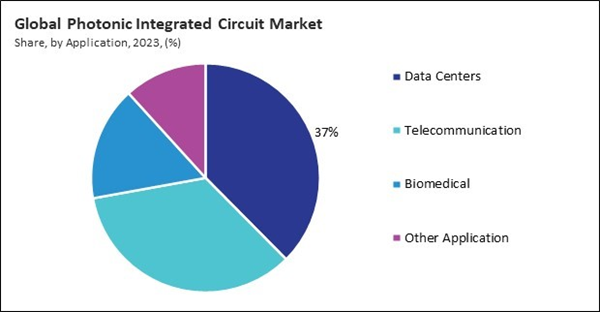The North America segment procured 37% revenue share in the photonic integrated circuit market in 2023. This leadership can be attributed to major technology companies, robust research and development activities, and significant investments in telecommunications and data centers. The region is also home to several key players in the photonics industry, driving innovation and advancements in photonic technologies.
As the digital economy expands, fueled by the exponential growth of internet usage, cloud computing, and the proliferation of data centers, the need for faster, more reliable data transmission has become paramount. The global data sphere is anticipated to increase from 33 zettabytes in 2018 to 175 zettabytes by 2025, as per a blog post from the International Data Corporation (IDC). With more than 5.4 billion active internet users worldwide, the demand for digital content is ever-increasing, leading to a surge in the creation of multimedia assets across various sectors, including retail, entertainment, and education. Hence, these factors will aid in the expansion of the market.
Additionally, the global rollout of 5G networks is transforming telecommunications by enabling faster speeds, lower latency, and greater capacity, essential for emerging technologies like autonomous vehicles, smart cities, and IoT. According to the International Telecommunication Union (ITU), since commercial deployment began in 2019, 5G coverage has increased to 40 percent of the world population in 2023. ITU stated that a 5G network covers 89 percent of the population in high-income countries; coverage remains limited in low-income countries. Thus, as 5G networks continue to expand and new applications emerge, the role of PICs in building and maintaining the infrastructure for next-generation telecommunications will only grow in importance.
However, Designing PICs requires advanced technology integrating optical components like lasers, modulators, and detectors onto a single chip. This integration is far more complex than traditional electronic circuits, necessitating sophisticated design tools, precise alignment, and advanced simulation software. Additionally, the materials used in PIC fabrication, such as indium phosphide or silicon photonics, are more expensive than those in standard electronic circuits, driving up material costs. Hence, the market expansion of PIC technology is constrained.
The leading players in the market are competing with diverse innovative offerings to remain competitive in the market. The above illustration shows the percentage of revenue shared by some of the leading companies in the market. The leading players of the market are adopting various strategies in order to cater demand coming from the different industries. The key developmental strategies in the market are Acquisitions, and Partnerships & Collaborations.
Driving and Restraining Factors
Drivers
- Rising Demand For High-Speed Data Transmission
- Growth Of 5G Networks Worldwide
- Emergence Of Quantum Computing
Restraints
- High Initial Costs And Complex Manufacturing
- Generation Of Considerable Heat During Operation
Opportunities
- Advancements In Optical Sensing And Imaging
- Rising Support From Government Initiatives
Challenges
- Competition From Traditional Electronic Integrated Circuits (Ics)
- Lack Of Standardization In The Photonic Integrated Circuit
Integration Process Outlook
On the basis of integration process, this market is bifurcated into hybrid and monolithic. The monolithic segment recorded 40% revenue share in this market in 2023. Monolithic PICs are fabricated using a single material platform, which simplifies manufacturing processes and can reduce production costs. This approach is particularly beneficial for producing large volumes of passive optical components and devices, ensuring reliability and consistency.Application Outlook
By application, this market is divided into telecommunication, biomedical, data centers, and others. The telecommunication segment garnered 36% revenue share in this market in 2023. This segment's growth is driven by the ongoing expansion of broadband networks and the increasing deployment of 5G technology, which requires high-capacity and reliable communication solutions.Material Outlook
Based on material, this market is classified into III-V material, lithium niobate, silica-on-silicon, and others. The lithium niobate segment procured 31% revenue share in this market in 2023. Lithium niobate is known for its electro-optic and nonlinear optical properties, making it an excellent choice for applications like modulators, switches, and waveguide devices. The adoption of lithium niobate-based PICs has been precipitated by the growing demand for high-performance optical devices in photonic computing and telecommunications.Regional Outlook
Region-wise, this market is analyzed across North America, Europe, Asia Pacific, and LAMEA. The Asia Pacific segment acquired 27% revenue share in this market in 2023. China, Japan, and South Korea are at the forefront of the development and deployment of these circuits, predominantly due to the expansion of their telecommunications and consumer electronics sectors.Recent Strategies Deployed in the Market
- Jun-2024: Nokia has acquired Infinera to strengthen its optical networks business by leveraging Infinera's expertise in silicon photonics and photonic integrated circuits, enhancing competitiveness and accelerating product development in digital signal processing and semiconductor materials.
- Mar-2024: Broadcom, Inc. has officially launched Bailly, the industry's first 51.2-Tbps co-packaged optics Ethernet switch. This innovative product leverages silicon photonics technology to achieve a 70% reduction in power consumption, making it ideal for scalable AI systems while enhancing bandwidth efficiency and cost-effectiveness for large data centers and next-generation AI infrastructure.
- Jul-2023: Hewlett Packard Labs' Large Scale Integrated Photonics Lab is expanding its research on optical content-addressable memories (CAMs), which demonstrate speeds ten times greater than their electrical counterparts. Despite challenges with energy consumption, the team plans to improve efficiency and scalability through ongoing research and collaborations.
- Mar-2022: TE Connectivity Ltd. partnered with Ranovus to develop innovative technology, culminating in the launch of the world's first monolithic 800G optical interconnect. By leveraging silicon photonics and co-packaged optics, this advancement significantly enhances power efficiency and bandwidth for data centers, meeting the needs of AI/ML workloads and next-generation networking solutions.
- Dec-2021: Intel has established the Research Center for Integrated Photonics for Data Center Interconnects, aimed at advancing optical I/O technology. The center will partner with leading researchers to improve photonics performance, meeting the growing demands of data center interconnect applications.
List of Key Companies Profiled
- Agilent Technologies, Inc.
- Broadcom, Inc.
- TE Connectivity Ltd.
- Hewlett Packard Enterprise Company
- Nokia Corporation
- Coherent Corp.
- Intel Corporation
- Cisco Systems, Inc.
- Huawei Technologies Co., Ltd. (Huawei Investment & Holding Co., Ltd.)
- Juniper Networks, Inc.
Market Report Segmentation
By Integration Process
- Hybrid
- Monolithic
By Application
- Data Centers
- Telecommunication
- Biomedical
- Other Application
By Material
- III-V Material
- Lithium Niobate
- Silica-on-silicon
- Other Material
By Geography
- North America
- US
- Canada
- Mexico
- Rest of North America
- Europe
- Germany
- UK
- France
- Russia
- Spain
- Italy
- Rest of Europe
- Asia Pacific
- China
- Japan
- India
- South Korea
- Taiwan
- Malaysia
- Rest of Asia Pacific
- LAMEA
- Brazil
- Argentina
- UAE
- Saudi Arabia
- South Africa
- Nigeria
- Rest of LAMEA
Table of Contents
Companies Mentioned
- Agilent Technologies, Inc.
- Broadcom, Inc.
- TE Connectivity Ltd.
- Hewlett Packard Enterprise Company
- Nokia Corporation
- Coherent Corp.
- Intel Corporation
- Cisco Systems, Inc.
- Huawei Technologies Co., Ltd. (Huawei Investment & Holding Co., Ltd.)
- Juniper Networks, Inc.










